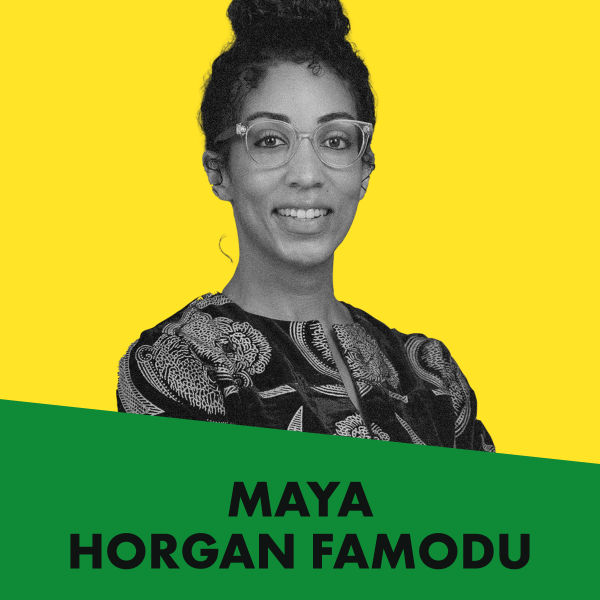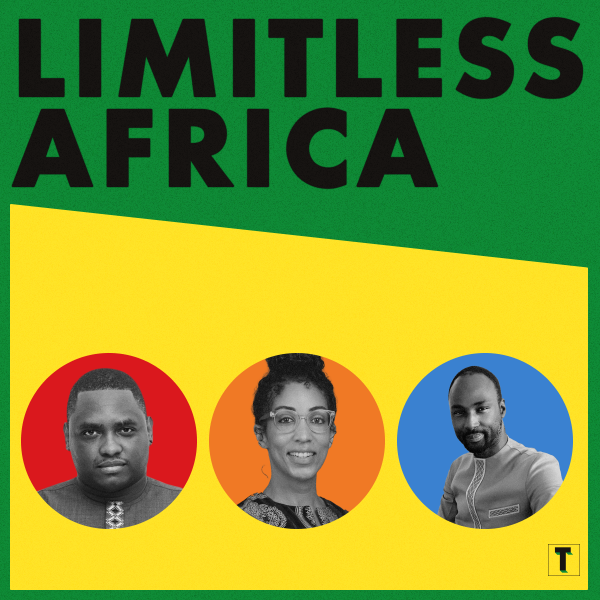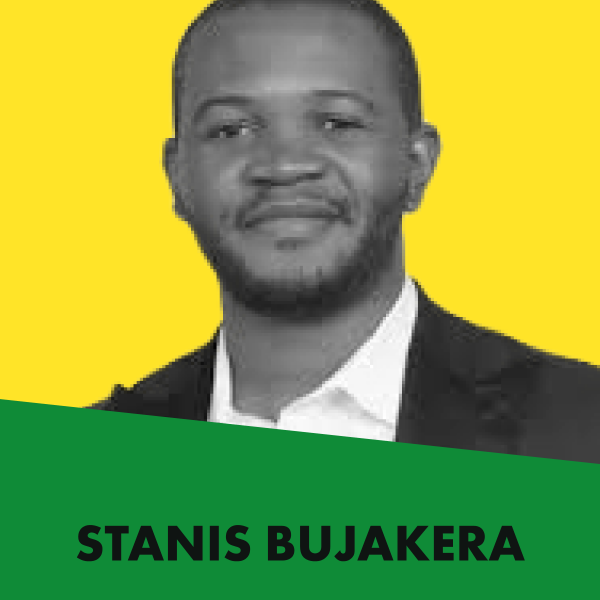What is the future of Africa? Gen Z speak out
With guests Elisa Jamal, Hadidjatou Nene Sandou Yaya, Jeremiah Thoronka

Episode notes
Africa has the youngest population in the world, 70% are under the age of 30. For this episode of Limitless Africa, we’re talking to Generation Z - that’s young people born between 1997 and 2012 - and we’re asking them about the future - their future. This episode was produced by our very own Gen Z-er Abigail Musherure.
Transcript
Claude: What is the future of Africa?
“A lady who dreams is a lady who sees, who see far. And when you see far, it’s because you want to do something beyond what people think that you can do.”
“But now I’m seeing the youth take for and bring about different strategies for networking, different strategies for building enterprises that are sustainable and that are community forward.”
“This is the African century, we have the youngest demographic. And we are going to be the first that every single coun...
Claude: What is the future of Africa?
“A lady who dreams is a lady who sees, who see far. And when you see far, it’s because you want to do something beyond what people think that you can do.”
“But now I’m seeing the youth take for and bring about different strategies for networking, different strategies for building enterprises that are sustainable and that are community forward.”
“This is the African century, we have the youngest demographic. And we are going to be the first that every single country in the world will want to work with.”
Claude: Welcome to Limitless, the podcast that asks the questions that matter for Africa.
In each episode, we ask three guests about one issue that matters to Africans. We’re looking for African solutions to African problems. The Limitless Podcast is supported by the U.S. Department of State and the Seenfire Foundation.
Africa has the youngest population in the world, 70% of us are under the age of 30. For this episode of Limitless Africa, we’re talking to Generation Z – that’s young people born between 1997 and 2012 – and we’re asking them about the future – their future.
First up is Elisa Jamal. She’s a 25 year old from Cabo Delgado in Mozambique. She campaigns against GBV – that’s the acronym for gender-based violence, violence against women. She’s also on the Mandela Washington Fellowship, a US exchange programme. Our journalist Abigail Musherure spoke to her.
Abigail: Where do you envision your life to be going in the next five years? What do you think Elisa’s future is?
Elisa: So I do really want to study gender-based violence further. I think that I want to do a master’s doing research, starting my research in that sector, and then ah doctorate’s degree, also focusing their research on gender-based violence response and sustainable solutions for survivors or even women at risk of experiencing it. um I hope that that educational career does get launched at some point. I have been applying and I’m hoping to hear perhaps good news in the future. But for now, ah what that trajectory looks like, it looks like opening up a business that’s sustainable, that’s eco-friendly, but that also gives back to the community. The thing that keeps bringing it back to its community, essentially.
Abigail: Wow, it seems like a lot of your what you see for yourself and your future is tied into ah where you’re from, where you’re you’re in Mozambique. It’s tied into what you see for their future. Could you just tell us a little bit about what you envision for the future of Mozambique?
Elisa: I feel like Mozambique has a lot of opportunities and a lot of access to different resources and it’s an untapped market. I feel like the youth here have tapped into the market of technology, which is something that is driving and pushing boundaries
I feel like the youth is tapped into that and they’re trying to to give back to the community in their own way by also training other people, by giving talks.
And I’m seeing that happen already in my own little town. Like there’s a group of women talks and we meet up and then we advertise our own businesses and or our ideas, or we kind of like network with one another and we push for the different concepts, ah different places to get different things, right? And it’s already like, I feel like we were stuck in a role of not doing much for society. because the war was such a big impact on in the community, especially in my region.
But now I’m seeing like the youth take for and bring about different strategies for networking, different strategies for building enterprises that are sustainable and that are community forward.
Abigail: Our bigger question is thinking about, we’ve talked about you, we’ve talked about your country, and now thinking about the future of Africa. What do you envision for the future of Africa?
Elisa: I think that the future of Africa is happening now. Obviously, we have the fastest growing population in the world where others are going back, we’re going forward. There was also this large opening of ideas when I travelled to the US, with the Mandela Washington Fellows, which was that I was surrounded by people who are already doing the things that we thought were not possible, or doing the things that are ah sustainable, that are eco-friendly, that are ah for progressive towards community, towards other people, that are already using every kind of technological advance that we’ve had as a society and placing them into sustainable businesses into things that are going to push society further.
So I feel like, for especially the youth that I met, they they were showing me that our future is now and that we can’t keep thinking that we had such a bad past that it hinders us from pushing forward to what happened to us as a society. We have to keep thinking like what do we do next to grow faster, to grow sustainably and to grow as we should have for the past 50 to 100 years.
Claude: Our next guest is from my homeland of Togo. Hadidjatou Nene Sandou Yaya is 25 years old. She’s the country director of EcoClimate Vision Togo, a non profit which raises awareness about climate change. Here’s our conversation.
Claude: As a young Togolese person, What do you see for yourself in the future? What do you envision your future to be? Because you spoke about dreams, but we know that dreams actually can come true. So tell us about perhaps the next five years in your life.
Hadidjatou: I want my organization to become the number one organization known when it comes to integrity, known when it comes to building ethical leadership, known when it comes to building effective leaders. And myself, I love speaking a lot because I started with public speaking. So I love facilitating sessions. I love speaking during conferences, forums. So within the five years, I would really love to impact my presence, not just in Togo, but in West Africa or in Africa in general, or even in the world, because A lady who dreams is a lady who sees, who see far. And when you see far, it’s because you want to do something beyond horizons, beyond what people think that you can do. And that’s what I’m seeing myself.”
Claude: When I hear you talk about Togo and its potential, and I’m asking you about your dreams for the future, it seems that you are also thinking of Togo and the Togolese future. What do you see for Togo’s future as a nation? Is there something that you feel that you can contribute to personally?
Hadidjatou: Yeah, definitely. I think contributing and developing my community is developing Togo because my community is also part of Togo. And the problem that I have in my community is actually a problem you can see everywhere in Togo. So my contribution is going to change that. Togo, for a better Togo that we all need. But talking about specifically the youth and their vision, I think we already have the potentials, but just that sometimes we are afraid to challenge the conventional wisdom because as Togolese we were born and educated to just respect everything that everybody is saying, respect elders, you know not really challenge. And we are so afraid so many times to challenge the conventional wisdom.
So I would love to see the youth challenging the conventional wisdom, imposing their abilities, their capabilities, the skills that they have innovating, because these are all these little ideas that are going to make the country great. But if we are waiting for something great before we start, I think we’re not going to start. But if we start little, we’re going to build the nation that we want. So I would love to see the youth being more free thinking and also be critical thinking, because if you cannot think critically, you cannot have vision. And if you cannot think critically, you cannot create the difference that you were born to be. I believe that we all have the unique qualities that nobody else can take from us. So I want all the Togolese to really take that out of them.
Claude: What you’re describing is a complete paradigm shift because when I was growing up in Togo… nobody was able to speak up when they were young. What you’re advocating is for young people to use their voice and to empower themselves in their communities. We started with you, then we talked about Togo, what do you see for the future of the continent of Africa at large?
Hadidjatou: So if you want the continent to be great, we have to accept different but potentialities that other people have. I believe that God created us differently for a reason. And when we are building our homes, we need a lot of different materials. We are not just using one material. So all those peoples we think that are different from us are here for us. So I want the Africans to understand that we are built different for a greater reason. And if we are able to accept ourselves, ah regardless of our beliefs, our um but where coming from, the the color of our body, all these ideas, if you are able to shift from that those ideas, I think we’re going to reach a greater level.
Claude: Our last guest is 23-year-old Jeremiah Thoronka from Sierra Leone. He founded Optim Energy a startup that generates clean electricity. He has big visions for his future and the continent. Here is his conversation with Abigail.
Abigail: What do you envision for your future, either personally, career-wise, in the next five years, or you can even extend beyond that?
Jeremiah: In the next five years, I want to see how I will be in the forefront of crafting Africa’s energy and climate future where, be at the forefront of technology development, policy, and tend to see how we can craft, you know, an energy future for Africa where we take those that are currently living in energy poverty, out of energy poverty.
Abigail: How do you envision the future of Africa at large? It’s a big question, but I want to know your answer. I want to know what that means to you specifically with your passions and your interests. What would you say to that?
Jeremiah: You know, you know then when you look at the news or when you read scholarly papers, Africa is an state that most of us are not proud of. We have some of our leaders changing constitutions, configuring constitutional mandates to suit them. We have the impact of climate change. Wrecking havoc across the continent. There is just so much happening in Africa that we’re not proud of.
But then at the same time also, there’s also the part of Africa where we’ve seen young people taking up leadership roles. We’ve seen young people becoming innovative, building innovative solutions. We have minority groups being listened to. And we have also certain governments across the continent going hard on corruption, opening the political space. You know, there are certain things that are happening that we’re proud of now. What I look forward to is how are we’re going to make sure that we focus on those things, that we’re going to demonstrate and scale them up, make sure that we bring more diverse voices into our political ecosystem.
We create funds, opportunities for vibrant young people creating ground-breaking technologies. And also we try to see how we can utilize our solutions, how we’re going to make sure that those solutions those young people are developing. that are reflective of who we are, our culture, our social status, our economic dynamics, and our geography can be well-spilled and adopted nationally instead of African governments to continue looking to the west or to the east -How are they going to look inwards. If I’m from Namibia, why wouldn’t I consume a product that was made in Congo? Or why as an Egyptian, why would I not consume a product that was made in Nigeria? Why wouldn’t I look in what we did in Africa? So how are we going to trade them all? How are we going to enable cross country collaborations? It’s already happening, but then we need to scale them up.
Abigail : So what about YALI?
Jeremiah: When we went for YALI I had no doubt that I will meet the best of the best from the continent. In my cohort I had people from Zambia, South Africa, Namibia, Nigeria, Kenya, Congo and since we met, we have gone on to work on excellent things.
If we collaborate more, we can do excellent things. So I think the future is bright. But we just have to make sure that we don’t lose sight of where we’re going. And more importantly, we don’t settle for anything less.
This is the African Century, we have the youngest demographic. So that is the future that I see for Africa, very much promising, very innovative, and we are going to be the first that every single country in the world will want to work with.
Claude: Thanks to all our guests. Elisa, Hadidjatou and Jeremiah are actually part of YALI, the Young African Leaders Initiative. YALI’s flagship program, the Mandela Washington Fellowship, brings outstanding young African leaders to the U.S to network and develop their skills. I hope you’ve been as inspired as I have been. Please share this episode with other young African leaders. Our potential is limitless.
Listen next
"It wasn't just an overnight thing. Seeds were planted."
With guests: Maya Horgan Famodu
LISTEN NOW 55 min
How did I make my first million?
With guests: Maya Horgan Famodu, Moulaye Taboure, Moutagna Keita
LISTEN NOW 15 min








